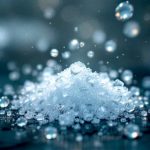Takeaways
- Caffeine and potassium interact in complex ways in the body
- Balancing caffeine intake with potassium can support athletic performance
- Excessive caffeine may lead to potassium loss through urine
- Potassium-rich foods can help offset caffeine’s effects on electrolytes
- Combining caffeine and potassium may boost cognitive function
- Proper balance of both supports overall health and wellbeing
Understanding Caffeine and Potassium
Caffeine helps us feel awake, while potassium is essential for bodily functions. Both substances have daily effects on us, and their interaction is important for overall health. This article will examine how caffeine and potassium work together in the body.
Caffeine acts as a stimulant, affecting the nervous system; it’s found in coffee, tea, and chocolate.[1] Potassium, present in foods like bananas and potatoes, regulates fluid balance within cells.[2] Both substances are critical for how we feel and function daily.
Examining caffeine and potassium together is useful because their effects are interconnected. Understanding how they interact helps us make better choices, so we can balance our intake for improved health. Let’s explore the details of this relationship.
Caffeine: More Than Just a Wake-Up Call
What is Caffeine?
Caffeine is a natural stimulant present in over 60 different plant species. It can be found in coffee beans, tea leaves, and cacao pods. Additionally, caffeine is included in energy drinks and some types of medications.
Caffeine quickly affects the brain by blocking adenosine, a chemical that promotes sleep. This action leads to increased alertness.[3] It also boosts other brain chemicals, such as dopamine and norepinephrine.
Caffeine reaches its peak effect within 30 to 60 minutes.[4] Its influence typically lasts 3 to 5 hours in adults.[5] However, individual caffeine metabolism varies due to factors such as genetics and daily habits.
Caffeine’s Effects on the Body
Caffeine impacts several body systems; it increases heart rate and blood pressure.[6] It also increases the rate of breathing. These effects usually begin soon after consuming it.
Common effects of caffeine include:
- Increased alertness
- Improved concentration
- Reduced fatigue
- Enhanced physical performance
- Faster reaction times
Caffeine can boost energy and focus, which helps people work more effectively.[7] Many individuals use it to start their day or to overcome mid-day fatigue.
However, caffeine can interfere with sleep patterns and cause jitters or anxiety in some individuals.[8] Overconsumption may lead to headaches or irritability. It’s best to consume caffeine in moderation.
Potassium: The Electrolyte Essential
Potassium Basics
Potassium is a mineral and electrolyte that helps regulate electrical signals in the body.[9] This mineral balances fluids inside and outside of cells, and supports functions of the heart, muscles, and nerves.
The body does not naturally produce potassium; it must be obtained from food or supplements.[10] Consuming the right amount helps maintain smooth bodily functions, as too little or too much potassium can create health problems.[11]
Daily potassium needs vary depending on age and sex:
| Age Group | Recommended Daily Intake |
|---|---|
| Adults | 2,600-3,400 mg |
| Teens | 2,300-3,000 mg |
| Children | 2,000-2,300 mg |
| Infants | 400-700 mg |
These values serve as a guide for healthy potassium intake, but individual needs can vary based on factors like activity level and health conditions. Always consult a doctor about your specific potassium requirements.
Potassium-Rich Foods
Potassium is naturally found in many foods, with fruits and vegetables being excellent sources. Whole grains and lean meats also contribute to potassium intake. Consuming a balanced diet can help meet your daily needs for potassium.
Top potassium-rich foods include:
- Bananas
- Sweet potatoes
- Spinach
- Beans
- Yogurt
- Salmon
- Avocados
Regularly eating these foods helps support healthy potassium levels, which are important for fluid balance, as well as muscle and nerve function. A diet rich in potassium may also help lower blood pressure.[12]
Maintaining consistent potassium levels is crucial, as low levels may cause weakness and muscle cramps, and high levels can lead to heart issues. Balance is key for overall health.
The Caffeine-Potassium Connection
How Caffeine Affects Potassium Levels
Caffeine affects how the body handles potassium because it acts as a mild diuretic, increasing urine production.[13] This more frequent urination can lead to the loss of minerals, including potassium.
When caffeine is consumed, the kidneys may excrete more potassium through urine.[14] This effect is usually minor for those with moderate caffeine intake. However, people who drink a lot of coffee may experience a more noticeable impact.
Here’s a look at potassium levels before and after caffeine:
| Time | Serum Potassium (mmol/L) |
|---|---|
| Before Caffeine | 4.0 – 4.5 |
| 1 Hour After Caffeine | 3.8 – 4.3 |
| 3 Hours After Caffeine | 3.9 – 4.4 |
These potassium changes are typically small and do not cause problems for most people. However, athletes or individuals with health concerns should monitor their intake to ensure they maintain a proper balance between caffeine and potassium.
Balancing Act: Caffeine and Electrolytes
Maintaining electrolyte balance is very important, and caffeine can slightly disrupt it. Potassium helps counteract some effects of caffeine, and it supports proper hydration and muscle function.[15]
Caffeine may increase sodium retention, which can affect fluid balance.[16] Potassium helps by promoting sodium excretion. These two minerals work together for proper hydration.
To help maintain electrolyte balance while consuming caffeine:
- Drink water with your coffee or tea
- Eat potassium-rich foods throughout the day
- Limit caffeine intake to moderate levels
- Consider electrolyte drinks during intense exercise
- Monitor your body’s response to caffeine
These actions can help keep your body balanced and support overall health while enjoying caffeine. Keep in mind that individual needs vary, and it’s important to listen to your body’s signals.
Benefits of Combining Caffeine and Potassium
Enhanced Athletic Performance
Athletes frequently seek natural ways to enhance their performance. Caffeine and potassium provide potential benefits that could boost endurance and reduce fatigue. This combination helps both the mind and body during exercise.
Caffeine enhances focus and alertness and delays the onset of fatigue.[17] Potassium is necessary for maintaining fluid balance and muscle function.[18] Together, these substances make a useful combination for athletes.
Sports that may benefit from this combination include:
- Long-distance running
- Cycling
- Swimming
- Team sports with extended play
- High-intensity interval training
Proper timing and dosage are important; athletes should experiment with the amount of each. Finding the right balance can improve performance safely. Always consult with a sports nutritionist or doctor before starting a new regimen.
Cognitive Function Boost
Our brains need good nutrition to function properly. Both caffeine and potassium have roles in cognitive health, and their combination may provide unique benefits for mental performance.
Caffeine increases alertness and concentration, and can improve memory and reaction times.[19] Potassium is important for overall brain health and helps regulate nerve signals. Together they may enhance cognitive function.
Ways to include both caffeine and potassium for improved mental performance:
- Start your day with a banana and coffee
- Snack on nuts and dark chocolate mid-afternoon
- Include leafy greens in your lunch salad
- Try a smoothie with spinach and green tea
- Have a small baked potato with your morning eggs
These combinations provide both caffeine and potassium, which can support brain function throughout the day. Experiment to find what works best for you, and remember that moderation is essential.
Potential Risks and Considerations
When to Be Cautious
Combining caffeine and potassium is not always beneficial. Certain situations require caution; health conditions and medications can change how your body responds to these substances. Being aware of these factors is crucial.
People with kidney problems should be extra careful because their bodies may have difficulty balancing potassium. Caffeine could worsen this problem. Heart conditions also require monitoring, as caffeine can affect heart rhythms.
Signs that you should consider reducing caffeine or increasing potassium:
- Muscle weakness or cramps
- Irregular heartbeat
- Fatigue or confusion
- Digestive issues
- Mood swings or anxiety
These symptoms may point to an imbalance or other health issues. You should consult a doctor if you experience these symptoms regularly.
Overconsumption Concerns
Too much of any substance can be harmful. This applies to both caffeine and potassium. Knowing safe limits can help to prevent health problems; it is important to understand your body’s tolerance levels.
Excessive caffeine can cause jitters and insomnia and may lead to dependence over time. Too much potassium is rare from food, but supplements can raise levels too high, which may strain the heart and kidneys.[20]
Safe consumption limits:
| Substance | Daily Safe Limit |
|---|---|
| Caffeine | Up to 400 mg for adults |
| Potassium | 2,600-3,400 mg for adults |
These limits serve as a general guide, as individual tolerance varies. Some individuals are more sensitive to smaller amounts, while others may tolerate more without issues. Always begin with small amounts and increase gradually.
Practical Applications
Optimizing Your Diet
Balancing caffeine and potassium requires planning and careful timing of meals and drinks. The objective is to support energy levels and overall health throughout the day. Small adjustments can have a significant effect.
Consider your caffeine sources first. Coffee, tea, and chocolate are common sources. Next, evaluate potassium-rich foods, such as fruits, vegetables, and legumes. Thoughtfully combining these sources can create a better balance.
Meal ideas that combine caffeine and potassium effectively:
- Breakfast: Oatmeal with banana and a cup of coffee
- Lunch: Spinach salad with grilled chicken and green tea
- Snack: Dark chocolate and almonds
- Dinner: Salmon with sweet potato and herbal tea
Timing is important. Caffeine consumed early in the day works best. Potassium-rich foods can be spread out through the day to support steady energy and nutritional balance.
Supplements and Alternatives
Sometimes, diet alone may not be enough. Supplements can help fill nutritional gaps. While natural sources are best for both caffeine and potassium, supplements do offer convenience and precise dosages.
Caffeine supplements are available in pills or powders that provide precise dosages. Potassium supplements require more caution, as too much can be dangerous. Always seek medical advice before starting any supplement.
Steps to transition to a balanced caffeine-potassium routine:
- Assess your current intake of both
- Gradually adjust caffeine consumption
- Increase potassium-rich foods in your diet
- Monitor how you feel and perform
- Consult a nutritionist for personalized advice
Natural alternatives exist as well. Herbal teas can offer gentle energy, and foods like apples or nuts provide steady fuel. These options can help you maintain a balance without relying on supplements.
FAQ: Common Questions About Caffeine and Potassium
Learning about caffeine and potassium leads to questions about how these substances interact and their effects on health and performance. Here are answers to some common questions.
These questions reflect genuine concerns and highlight why this topic is important. Learning more allows us to make more informed choices that support our health and wellness goals.
Can caffeine cause potassium deficiency?
How much caffeine is too much?
Does decaf coffee affect potassium levels?
Can I take potassium supplements with my morning coffee?
How long does caffeine affect potassium levels?
Are energy drinks a good source of both caffeine and potassium?
Conclusion
Caffeine and potassium have essential roles in the body, and their interaction impacts our daily lives. This article has explored how they work both together and separately. This knowledge can empower you to make more informed choices.
Balancing caffeine and potassium has benefits, including improved athletic performance and brain function. However, moderation is crucial, as too much of either substance can cause problems. Listening to your body can help you find the right balance.
Remember, individuals respond differently to caffeine and potassium. What works for one person may not work for another. Experiment carefully to find your ideal intake and pay attention to how you feel. Consult with healthcare professionals for personalized advice.
By learning more about these substances, we can optimize our health and enjoy their benefits while minimizing the risks. This balanced approach helps support our overall well-being, allowing us to feel and perform our best each day.
Caffeine is a well-known central nervous system stimulant belonging to the methylxanthine class of chemicals. It acts primarily by antagonizing adenosine receptors in the brain, leading to increased neuronal activity.
Source: “Uses of psychotropic drugs by university students in Switzerland” https://www.ncbi.nlm.nih.gov/pmc/articles/PMC11175452/
Potassium is crucial for maintaining cellular fluid balance. It plays a key role in the sodium-potassium pump, which regulates the movement of water and electrolytes across cell membranes. Bananas and potatoes are known good dietary sources.
Caffeine acts as an adenosine receptor antagonist, effectively blocking the neurotransmitter’s actions and reducing its promotion of sleep and relaxation, which results in alertness.
Source: “Uses of psychotropic drugs by university students in Switzerland” https://www.ncbi.nlm.nih.gov/pmc/articles/PMC11175452/
Caffeine is rapidly absorbed from the digestive tract, and peak plasma concentrations generally occur within 30 to 60 minutes, which is typically when its stimulant effects are most pronounced.
Caffeine’s half-life is typically between 3 and 5 hours in adults, meaning that its effects will gradually diminish over this timeframe, though this can vary.
Caffeine has stimulatory effects on the cardiovascular system that can lead to an increase in heart rate and blood pressure. These effects are due to caffeine’s impact on catecholamine release and direct action on the heart muscle.
Source: “International society of sports nutrition position stand: caffeine and exercise performance” https://www.ncbi.nlm.nih.gov/pmc/articles/PMC7777221/
Caffeine’s ability to block adenosine receptors is responsible for many of its positive impacts on cognitive performance, including alertness and focus.
Source: “Uses of psychotropic drugs by university students in Switzerland” https://www.ncbi.nlm.nih.gov/pmc/articles/PMC11175452/
As a stimulant, caffeine’s effects can negatively impact sleep and cause jitters and anxiety, especially when consumed late in the day or in large quantities.
Potassium is a crucial electrolyte that supports the functioning of excitable cells, such as nerves and muscles, through its role in maintaining the proper resting membrane potential and action potential generation. It also regulates cell communication.
Potassium is an essential mineral that the body can’t synthesize itself. Therefore, it must be consumed from food and/or supplements to maintain proper bodily function.
Hypokalemia (low potassium) can cause muscle weakness, cramps, and heart rhythm disturbances, while hyperkalemia (high potassium) can also lead to serious heart problems. The body tightly regulates potassium to maintain a healthy balance.
Potassium can aid in the reduction of blood pressure by promoting sodium excretion and relaxing the walls of blood vessels.
Caffeine’s diuretic effect results in increased urine production which can also cause some increase in excretion of minerals, including potassium.
Source: “A randomised trial to assess fluid and electrolyte balance responses following ingestion of different beverages in young and older men” https://www.ncbi.nlm.nih.gov/pmc/articles/PMC10492686/
Due to its diuretic properties, caffeine can increase urine production which may lead to increased excretion of potassium via the kidneys.
Source: “A randomised trial to assess fluid and electrolyte balance responses following ingestion of different beverages in young and older men” https://www.ncbi.nlm.nih.gov/pmc/articles/PMC10492686/
Potassium plays a key role in fluid balance, muscle contractions and nerve impulses, all of which are impacted by caffeine, and can help to offset or counter some of the negative effects of the stimulant.
Caffeine may have some effect on sodium retention, though the relationship is complex and studies have had mixed findings. Further research is needed to clarify how caffeine may impact sodium levels and fluid balance.
Caffeine’s ability to block adenosine receptors is responsible for many of its positive impacts on cognitive performance, including alertness and focus, and this can delay the feeling of fatigue.
Source: “Uses of psychotropic drugs by university students in Switzerland” https://www.ncbi.nlm.nih.gov/pmc/articles/PMC11175452/
Potassium plays a critical role in cellular hydration and proper muscle contractions, and it ensures optimal muscle performance during physical activity.
Caffeine’s impact on the nervous system can enhance cognitive functions, leading to improvements in alertness, focus, memory, and reaction times.
Source: “Uses of psychotropic drugs by university students in Switzerland” https://www.ncbi.nlm.nih.gov/pmc/articles/PMC11175452/
While it is rare to get too much potassium from food, supplements can lead to hyperkalemia, a condition of excessive potassium levels in the blood, which can strain the heart and kidneys.
Scientific and medical authorities have established that up to 400 mg of caffeine a day is safe for most healthy adults. This amount provides the benefits of caffeine without causing significant adverse effects in most people. However, individual tolerance varies greatly.
Decaffeinated coffee has reduced levels of caffeine, resulting in a reduced diuretic effect and minimal effect on potassium levels compared to caffeinated coffee.
While it is generally considered safe to consume potassium supplements with coffee, the effects of caffeine may interfere with optimal absorption. Further studies are needed to confirm.
Caffeine’s diuretic action may temporarily impact potassium levels, peaking within 1-2 hours after consumption, and levels return to normal as caffeine is metabolized.
Energy drinks often contain excessive amounts of sugar and caffeine. Though some may contain added potassium, they’re not ideal sources of either, and natural sources are healthier.



